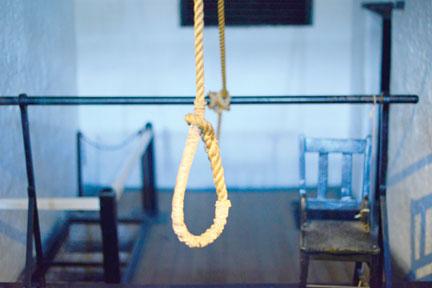You are here
France’s former justice minister urges Jordan to vote against death penalty at UN
By Dana Al Emam - Jun 12,2014 - Last updated at Jun 12,2014

AMMAN — Robert Badinter, former French justice minister and anti-death penalty activist, has urged Jordan to vote against capital punishment at the UN General Assembly this fall.
“Each year there is a debate in the UN General Assembly at the instigation of Italy, Spain and France that asks for a universal moratorium on the use of the death penalty,” he said, highlighting the “tremendous” progress towards its abolition in the world.
“Today [out of] the UN’s 198 state members, there are approximately 100 states that have abolished the death penalty by law plus almost 50 states that do not use the death penalty, although it is in the law.”
Speaking at a session at the Talal Abu-Ghazaleh Knowledge Forum on Tuesday, Badinter added that the European Court of Human Rights, in its interpretation of the European Convention on Human Rights, considers the death penalty as “an inhumane, cruel and useless penalty”.
He noted that the International Criminal Court, as well as all other international judicial bodies, refuses to use the death penalty against the world’s worst criminals who have committed crimes like mass homicide, genocide, collective rapes and deportation of population.
France abolished the death penalty in 1981, becoming the world’s 35th country to do so, the former minister said, highlighting the importance of regional treaties against capital punishment.
In Europe, which consists of 48 states, the death penalty is banned everywhere but Russia, he said, adding that all European countries that ban capital punishment have collectively passed a regional agreement that removes the penalty from their national laws.
“In South America there is a treaty that prohibits the use of the death penalty; also most of the United States of America does not use the death sentence except for a few states in the south,” Badinter said, noting that the penal disposition of criminal law in the US differs from one state to another.
He described the execution cases in the US as racism and a remnant of slavery, charging that African Americans constitute the majority of those who receive capital punishment in southern states.
Badinter argued that the jurors’ approach and considerations of the crime and the accused differ according to skin colour, highlighting that such differentiation is “not clearly felt or consciously applied”.
However, the number of death penalty executions in the US has gone down by almost 50 per cent since president George W. Bush left office, according to Badinter.
Standing against death penalty, he said, should not be seen as a form of leniency towards criminals.
“I have no tenderness for crimes; I have no tenderness for criminals… I only have faith in our ideals and a belief that we should not forget to make the world better,” he said.
“Life is not in our possession, we are all sentenced to death, and therefore we do not have to take the place of fate or God.”
Related Articles
UN High Commissioner for Human Rights HH Prince Zeid has called on all countries that still apply the death penalty to abolish capital punishment.
Senate President Abdur-Ra’uf S. Rawabdeh on Monday met with France’s former justice minister Robert Badinter and discussed ways to boost bilateral relations.
AMMAN — “The choice related to death penalty should be made with a cold mind, not a hot heart,” said Nizam Assaf, director of the Amman Cent














